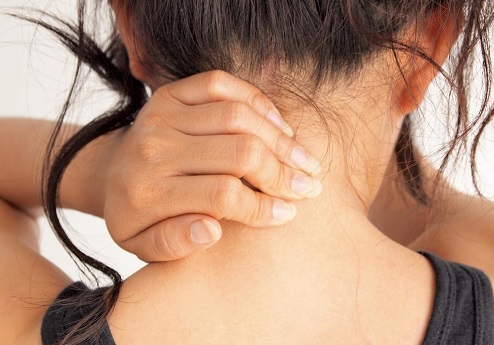Upper back pain may be described as any form of discomfort and pain experienced on the back side of the chest or the upper abdominal region. The majority of people are likely to experience this pain at some point of their life. Upper back pain may lead to muscle stiffness or tightness and a sharp pain in that region. However, upper back pain is not as common as lower back pain. This is mainly because the thoracic spine makes fewer movements compared to the spine in the lower back. However, this pain should never be overlooked.

What Causes Upper Back Pain?
Injury
Pain in the upper back is commonly caused by injury or strain on the discs, ligaments and muscles on the upper spine. The majority of muscle injuries associated with this condition occurs in the muscles that are next to the shoulder region. The glenohumeral joint is one of the most maneuverable and unstable joints in the body. The muscles covering this joint are very vulnerable to injury which may lead to upper back pain.
Unhealthy Lifestyle
There are certain lifestyles that may make one more vulnerable to this pain, which includes:
Repeatedly stressing one region of your back;
Having an overweight body;
Minimal exercising or too much exercises, especially using the wrong techniques;
Carrying heavy objects;
Sitting in an incorrect posture for too long;
Exposed to high levels of stress for a long time.
Underlying Health Conditions
There are various health conditions that may predispose you to upper back pain. These conditions are mostly spinal problems, such as osteoarthritis, trapped nerves, rheumatism, slipped discs, myofascial pain and "wear and tear" arthritis of the spinal injuries joints on the thoracic and neck vertebrae. All these conditions may make the patient experience pain in the upper back.
How to Deal With Upper Back Pain
Take OTC Medication
Over the counter drugs can turn out to be very helpful in relieving upper back pain. Such drugs include acetaminophen like Tylenol and Nonsteroidal anti-inflammatory medications, including Motrin, Aleve, Advil and aspirin. These drugs help by reducing inflammation and pain of the affected tissues.
Apply Ice or Heat Compress
Using an ice pack to reduce pain and swelling; apply heat compress to relieve pain and muscle stiffness. If you can't decide to use which method, then just switch between them until you make up your mind.
Correct Your Posture
Sitting or standing in the wrong posture puts a lot of stress on your upper back. Therefore, you should sit straight or stand tall with the shoulders and stomach pulled in. This helps in supporting the back, relieving the pain and assisting the recovery. Be sure to keep in mind that you should avoid a slouch or slump sitting posture as much as possible.
Have Sufficient Sleep
If you are experiencing upper back pain, you should take a break and have a good bed rest. However, you should not remain on the bed for too long as this may worsen the problem and lead to more complications such as muscle weakness and stiff joints. Instead, you should try to return to activity gradually and avoid things that may make your situation worse.
Do Exercise
Before engaging in any exercise to relieve upper back pain, you should first consult a doctor. The doctor will recommend the best suited exercises for you to strengthen and stretch the essential muscles in your back, stomach and shoulders. As such, exercising these muscles will improve your posture and improve body balance. Additionally, these exercises will reduce the pain and facilitate healing.
Watch the following video to learn some stretching exercises to ease the upper back pain:
Maintain a Nutritious Diet
Fresh fruits, vegetables, eggs, fish and other nutritious foods should be added into diet for eating well is one of the ways to prevent upper back pain. For instance, eating food that is rich in vitamin D, calcium and protein can help in preventing osteoporosis, a condition which predisposes the back to compression and fractures. This in turn helps in preventing upper back pain.
Other Methods for Relieving Upper Back Pain
There are many other ways through which you can reduce the severity of upper back pain and accelerate healing process.
You should be very careful when lifting objects. If you would like to lift an object, always bend the knees, keep the back straight. Additionally, you should keep the load close to the body when carrying it around.
Use a pain diary. With these methods, you should write down how various aspects of your life affect your pain, including sleep patterns, thoughts, medicines and even moods. This is very vital as it will help both the doctor and you to find the best way to manage your pain.
Stress reduction is also vital in the fight against upper back pain. This is mainly because stress can worsen the back pain. Therefore, you should carry out relaxation exercises, breathe deeply and meditate regularly to bring your stress levels down.
When to See a Doctor
Basically, upper back pain are not a serious disease, but if it happens with other symptoms, it may indicate a sever condition. Therefore, if you experience upper back pain and the following symptoms at the same time, you should seek the attention of a doctor immediately. Such symptoms include:
Loss of bladder or bowel control;
Weakness of the legs or arms;
Numbness or even a tingling sensation in your legs, belly, chest and or arms.
- 1.

View All Comments /Add Comment